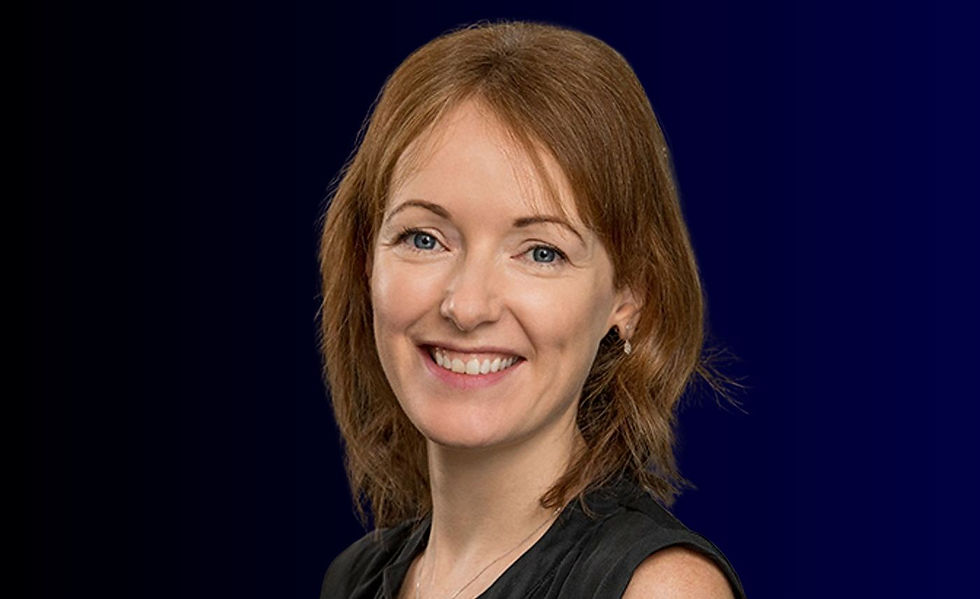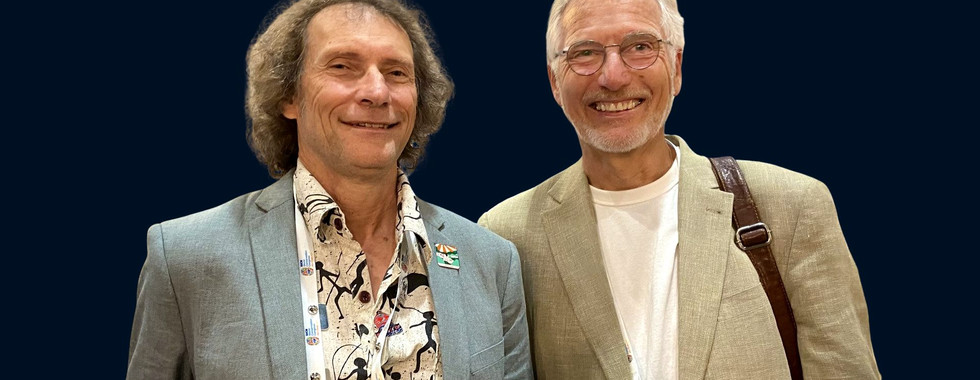Australia at the IUCN 2025 World Conservation Congress
- Nov 11, 2025
- 11 min read
Updated: Nov 13, 2025
A report on highlights and outcomes of the IUCN World Conservation Congress.
Australian Delegate Highlights
Erica McCreedy & Blathnaid Byrne elected to IUCN Council
Two nominees from Australia - Erica McCreedy and Bláthnaid Byrne - were elected to serve on the IUCN Council at the World Conservation Congress.
The IUCN Council is the principal global leadership and governing body of IUCN. For the next 4 years, Erica will represent Oceania and Australia on the Council, and Bláthnaid will oversee the finances of the organisation as the IUCN Treasurer.
Erica McCreedy is a proud Ngāti Raukawa and Te Aitanga-a-Hauiti woman and executive leader, committed to elevating Indigenous voices in global conservation and strengthening Indigenous-led conservation.
"I’m honoured to begin my term as a Councillor at IUCN, advocating for Indigenous leadership in global environmental governance. I look forward to partnering with communities and organisations to turn global commitments into real, local impact." - Erica McCreedy

Bláthnaid is an accomplished senior leader in finance and sustainability with a passion for driving environmentally conscious decision-making.
"Catching my breath after spending an eventful week with more than 10,000 other delegates at the IUCN World Conservation Congress in Abu Dhabi. This event, held every 4 years, convenes the broad and diverse range of members from around the world to reflect on the outcomes of the past 4-year programme, as well as looking to the next 4 years and beyond to decide how the organisation can have the greatest impact for nature conservation. I’m very excited to share that I was elected to be Treasurer on the IUCN Council for this new term. Thank you, Peter Cochrane, for your active support, and to WWF Australia for nominating me." - Bláthnaid Byrne
Thank you to Peter Cochrane, IUCN Vice President
Outgoing Oceania Regional Councillor and Vice President, Peter Cochrane, received well-deserved votes of thanks and commendations for his 9 years of exemplary and dedicated service to IUCN, ACIUCN, and nature conservation.
"It’s been an amazing honour and privilege to have served for 9 years on the IUCN Council, and as one of the IUCN Vice Presidents for the last four years, and an absolute delight to see Erica McCreedy, from NAILSMA, Australia’s Indigenous Peoples Organisation member of IUCN, elected to the IUCN Council at the IUCN World Conservation Congress in Abu Dhabi. Here with our re-elected President, the amazing Her Excellency Razan Al Mubarak, at the Congress." - Peter Cochrane
Australians scoop up Commissions Awards
An unprecedented number of Australian delegates were the recipients of prestigious IUCN Commission Awards at Congress, in recognition of their world-leading efforts in nature conservation.
Congratulations, well done, and thank you to Barry J Hunter, Erica McCreedy, Joanne Wilson, Rosalie Chapple, Peter Cochrane, Lisa Malcolm, Kate Davey, Marc Hockings, Angela Newey, Tia Stevens, Adam Ellis, Emily Nicholson, Jessica Walsh, Martine Maron, Ben Fitzpatrick, Peter Smith, José R. Ferrer Paris, and David Keith.
World leaders: the new IUCN Green List Standard
The IUCN Green List Standard for Protected and Conserved Areas is being revised to ensure it continues to reflect and support effective, equitable management. Since its launch in 2016, more than 100 sites worldwide have achieved Green List status. Guided by feedback, the IUCN Green List Standard Committee has developed a new draft now open for consultation, inviting diverse perspectives to help refine and strengthen the Standard for global use.
Australian delegates on the IUCN Green List Standard Committee, Dr Joanne Wilson and Professor Marc Hockings, led sessions at Congress to explore how the Standard can drive conservation impact globally, share the key updates and the process of developing this new draft. They also led discussions and feedback opportunities for attendees to contribute to the ongoing improvement of the Standard.
World leaders: The Green Status of Ecosystems

Dr Jessica Walsh from the Queensland University of Technology has been leading the global taskforce to develop the Green Status of Ecosystems for IUCN.
At Congress, Jessica presented on the proposed IUCN Green Status of Ecosystems (GSE), which aims to provide an assessment of past, current and future recovery of ecosystems. The GSE is a novel, consistent approach to assessing the current conservation status of ecosystem types and for measuring past conservation impact and future recovery potential for ecosystems globally. Jessica and her colleagues outlined the draft framework and provided session attendees with interactive case studies to demonstrate its use. The session also aimed to enhance engagement and consult with the conservation community, including Indigenous people, to support the ongoing development and refinement of the Green Status of Ecosystems.
World leaders: The Global Ecosystems Typology
The Global Ecosystem Typology (GET) was developed by the IUCN Red List of Ecosystems Thematic Group of the IUCN Commission on Ecosystem Management.
Australian academic experts - notably Prof David Keith, Prof Emily Nicholson and Prof José Ferrer-Paris - lead the Thematic Group and the development of the GET for IUCN, and presented on the progress of this work at Congress.
The IUCN GET is a comprehensive global classification framework for Earth’s ecosystems that integrates their functional and compositional features. This new typology helps identify the ecosystems that are most critical for biodiversity conservation, research, management and human wellbeing into the future.
The IUCN Global Ecosystem Typology provides a common international language for integrating the many national classifications and maps that describe the world’s ecosystems. The GET facilitates generalisations about sustaining ecosystem functionality and mitigating threats to ecosystems through conservation and restoration action across borders.
World leaders: The Global Ecosystems Atlas

Associate Professor Nicholas Murray is an Australia-based research scientist at James Cook University (JCU).
Nicholas is the Lead Scientist of the Global Ecosystems Atlas (GEA) initiative, and presented with his team at Congress on the progress so far and the plans for this initiative.
The Atlas will be the first comprehensive, harmonised open resource on the extent, change, condition and risk of all the world’s ecosystems.
The Atlas aims to turn global standards like the IUCN Global Ecosystem Typology and Red List of Ecosystems into actionable, national tools.
The Atlas will empower decision-makers with insights for sustainable development and a deeper understanding of Earth's ecological diversity. It will provide everything you need to know about the distribution, change, condition and risks of ecosystems worldwide. The Atlas will combine existing high-quality ecosystem maps and new ecosystem maps to fill data gaps. By enabling collaboration across sectors and countries, the Atlas will generate knowledge and insights on ecosystems, help improve and scale existing initiatives, and enhance consistency and coherence in stock-taking, reporting, and decision-making.
World leaders: The IUCN Red List of Ecosystems

Professor Emily Nicholson of the University of Melbourne has been leading the development and oversight of the IUCN Red List of Ecosystems (RLE), as co-lead of the RLE thematic group for IUCN.
Professor Nicholson provided training sessions for Congress attendees on how to use the IUCN Red List of Ecosystems assessment framework, as well as presenting on the development and future plans for the RLE.
IUCN’s Red List of Ecosystems (RLE) is a global standard for assessing risks to ecosystems. It allows us to identify common symptoms (both spatial and functional) to understand the level of risk that an ecosystem is facing.
The IUCN RLE has been adopted as a headline indicator under the Global Biodiversity Framework. The RLE is a scientifically robust, transparent, evidence-based support tool that helps us understand ecosystem dynamics, as well as which ecosystems are healthy, which are at risk of collapse in the near future, and why.
The Wilderness Society Delegation + Information Booth
Led by Jo Hopkins, The Wilderness Society delegation contributed to high-level negotiations and contact group discussions, voted on every motion at the Members Assembly, and even manned an information booth to share their purpose, goals, and great work protecting nature across Australia.
" We are here to discuss & debate the most pressing conservation issues globally and set an ambitious 4-year agenda for nature, people and the planet. There is so much goodwill here and so many people doing important work, and it’s great that the Wilderness Society is right among all the action." - Jo Hopkins

Roundtable with IUCN Director General, Grethel Aguilar
In the evening after the Oceania Regional meeting on Sunday 12th October, several member delegates from Oceania (Australia, New Zealand, and Pacific Island Countries) were pleased to spend time with the IUCN Director General and the incoming Oceania Regional Councillor, Erica McCreedy.
This roundtable gathering was a more intimate opportunity for delegates to discuss the most pressing environmental challenges of the Oceania region, as well as solutions.

A few Australian IUCN Member Reflections

Nicola Rivers, Co-CEO of Environmental Justice Australia, attended the IUCN Congress in person, in Abu Dhabi. Attending the Congress reminded her just how interconnected our struggles, and our solutions, really are.
"As a member of the IUCN, EJA joined other Australian and international organisations in bringing a legal and rights-based perspective to the global conservation conversation. For me, it was a chance to connect our work at home to global movements, and to see how international law and advocacy can shape the environmental standards that guide us in Australia." - Nicola Rivers
Read Nicola's account of her key takeaways from the IUCN Congress:

Dylan Pursche, IUCN Joint National Focal Point for Australia at the Department of Climate Change, Energy, the Environment and Water, attended in person and shared his experience on LinkedIn
"Talk about an entry to multilateralism! Beyond stoked to have had the opportunity to represent the Department of Climate Change, Energy, the Environment and Water at the IUCN's 2025 World Conservation Congress in Abu Dhabi.
As one of the largest gatherings of governments, scientists and civil society, this important conference saw all IUCN members engage across dozens of cross-cutting environmental negotiations.
Personally and professionally, I feel humbled and in awe that I was able to speak, and ultimately shape, the international conservation agenda for the next four years. Having grown up watching Steve Irwin and David Attenborough, being able to engage internationally on the environment is a real dream come true. Australia was also able to secure a positive vote for its sponsored Motion 85, which encourages the private sector to take action to achieve a nature positive future!" - Dylan Pursche

Dr Jody Gunn, CEO of the Australian Land Conservation Alliance, attended from Australia and shared her reflections via LinkedIn.
"Global engagement matters! Local Actions to Global Solutions was the theme of the Australian Land Conservation Alliance's annual Conference. Having just wrapped up this energising convening, we've now turned our minds to the IUCN World Conservation Congress in Abu Dhabi, where 10,000 global delegates have come together to set priorities and drive conservation and sustainable development action.
As a new IUCN member, ALCA was able to cast a vote this evening on a 20-year vision that outlines how IUCN can play a vital part in delivering transformative impact in three areas: conserving nature and biodiversity effectively; addressing the drivers of nature loss; and advancing a more just and equitable society. From COP15 in Montreal in 2022 that set a strong global mandate to live in harmony with nature, to the IUCN World Conservation Congress today setting a 2045 vision of Unite for Nature, ALCA continues to engage actively in local, national and global frameworks that are progressing outcomes for people and planet." - Jody Gunn

Andrew Cox, CEO of 4Nature, attended in person and also shared his reflections on LinkedIn
"It’s enjoyable being part of the huge community striving to protect and recover nature. This is 4nature’s first chance to vote as a newly admitted IUCN member.
My mission at the Congress is to link up with those working globally on the invasive species threat. Specifically, I’m searching for partners to support 4nature’s Global Environmental Biosecurity Initiative. It’s a new plan to build stronger defences for nature and slow the spread of invasive species. It's great to be working with the IUCN invasive species staff to scale up action on Global Biodiversity Target 6!" - Andrew Cox
Key Congress Outcomes
Key Statistics
The 2025 IUCN World Conservation Congress was the largest gathering in IUCN history, bringing together approximately 10,000 participants from 189 countries both on-site and online, 140 booths and pavilions and over 1,000 events.
The Members’ Assembly adopted 144 Resolutions and Recommendations, including the first IUCN policy on synthetic biology in relation to nature conservation and the recognition of ecocide as a crime.
Members adopt a new 20-year guiding vision for IUCN
Members formally adopted the new 20-year strategic vision for IUCN and nature conservation, titled Unite for Nature on the Path to 2045
This document sets the overarching direction for IUCN and global efforts to tackle biodiversity loss and climate change.
The core pillars of the new 20-year vision include:
Linking ecological outcomes with social justice and human wellbeing.
Mainstreaming nature across sectors, from food systems to the blue economy.
Scaling inclusive conservation across land, freshwater, and marine systems.
Embedding equity and rights-based approaches into conservation, especially for Indigenous Peoples, Local Communities, women, and youth.
The Vision was passed together with the IUCN Work Programme (or implementation plan) for 2026–2029, titled Nature 2030: One nature, One future
Members elect new Councillors & Commission Chairs
Members of the International Union for Conservation of Nature (IUCN) elected the Union’s leadership team for the next four years at Congress.
Her Excellency Razan Khalifa Al Mubarak will serve a second term as IUCN President, alongside newly elected leaders across its Commissions and Council.
Together with IUCN Director General Grethel Aguilar, the leadership team will guide and strengthen the organisation’s work over the next quadrennial.
Presentation of the Abu Dhabi Call to Action
The IUCN World Conservation Congress ended with the presentation of the Abu Dhabi Call to Action, a document that outlines key priorities and the most pressing global challenges and opportunities discussed at the Congress.
The Call to Action summarises the collective outcomes, commitments, and calls for action expressed throughout Congress, centred around reaffirming nature as the foundation of human and planetary well-being; strengthening multilateralism and collective action; ensuring justice and inclusive participation; advancing science, knowledge, innovation, and education; and scaling up and aligning resources for nature and climate action.
An IUCN Members-based process of consultation, review, and advice shaped the Call to Action, which was presented and welcomed by acclamation during the 9th sitting of the Members’ Assembly on 15 October 2025.
Update: IUCN Red List of Threatened Species
A press conference at Congress presented the latest global update of the IUCN Red List of Threatened Species, the authoritative source on species extinction risk. By drawing on the most up-to-date scientific data, the Red List helps to set priorities and measure progress toward international biodiversity goals.
At Congress, experts outlined changes in species status, the threats and drivers behind them, and what these trends mean for global conservation. The IUCN Red List now includes 172,620 species of which 48,646 are threatened with extinction.
Highlighted assessments included three species of Arctic seals, which have moved closer to extinction due to climate change; the comprehensive reassessment of all bird species, which are globally declining due to deforestation; and the positive rebound of green sea turtles due to conservation action.
Update: IUCN Global Standard for Nature-based Solutions
IUCN officially launched the Second Edition of the IUCN Global Standard for Nature-based Solution at the IUCN World Conservation Congress 2025, marking a crucial step forward in the Union’s efforts to advance Nature-based Solutions that are effective and robustly rooted in science.
“The revised Global Standard reflects lessons learned since 2020 and rising demand for credible, science-based action. It gives practitioners and decision-makers the tools to design solutions that are effective, equitable and lasting, grounded in both science and real-world experience,” emphasised Angela Andrade, Chair of the IUCN Commission on Ecosystem Management (CEM) and Chair of the International Standard Committee (ISC).
26 New Protected Areas added to the Green List
In a ceremony at Congress, IUCN honoured 26 new Listings over the last year on the IUCN Green List of Protected and Conserved Areas, raising the total to 104 Listings, now covering 230 individual sites worldwide.
These sites exemplify verified conservation success - combining equitable governance, strong community engagement, ecological integrity, and effective management.









































Comments